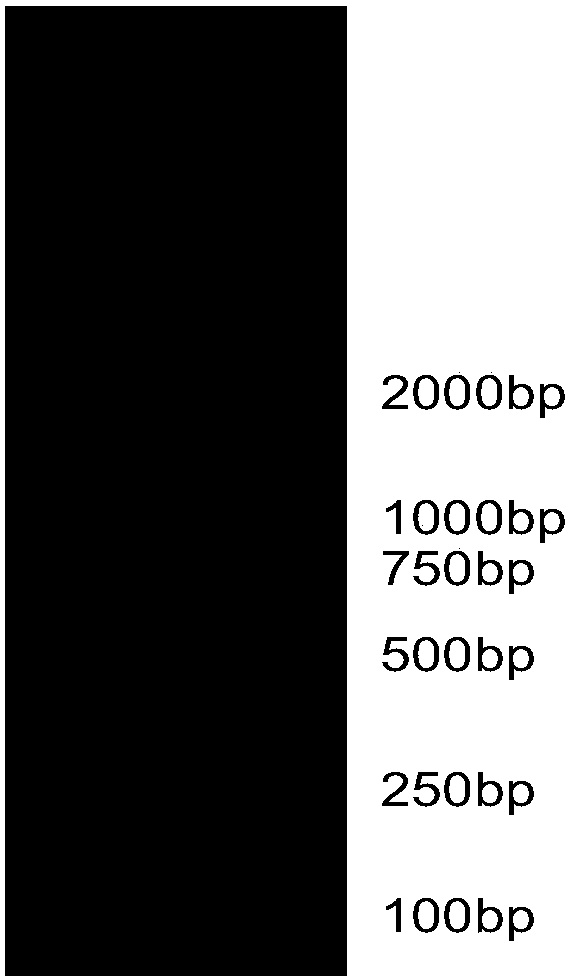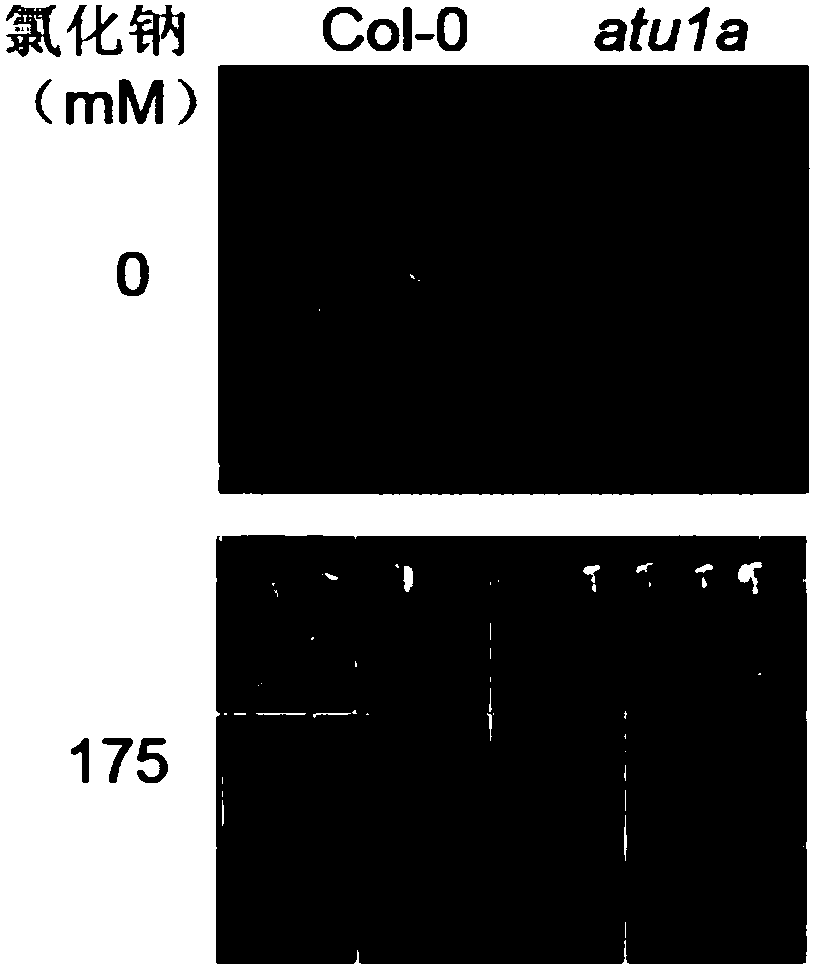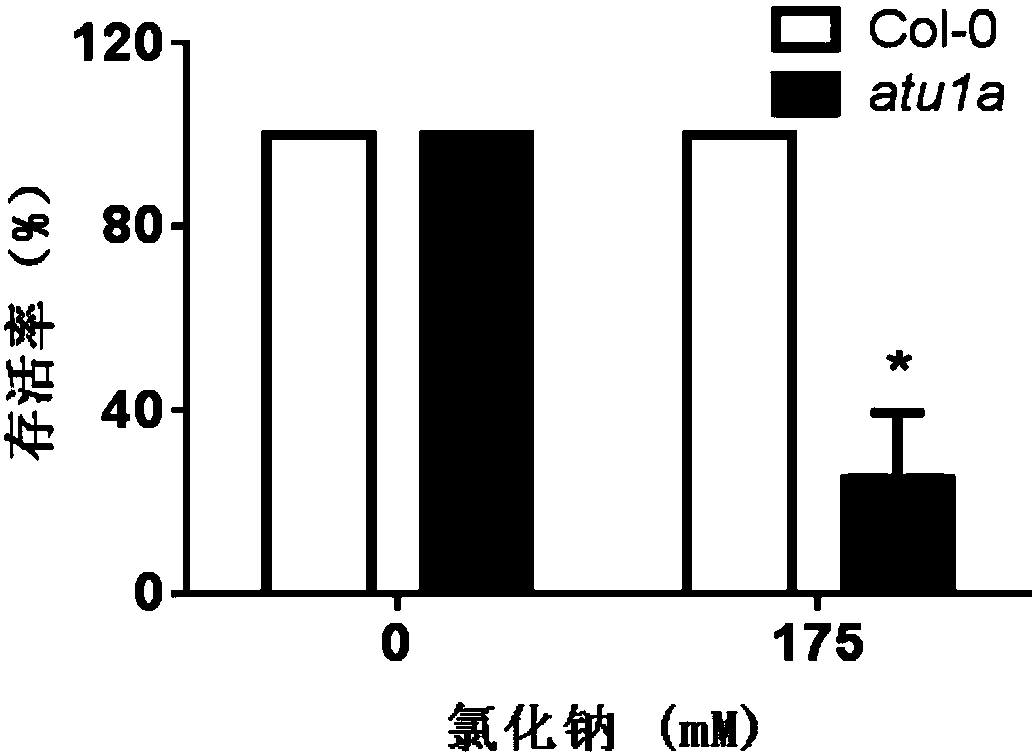Application of arabidopsis U1A gene to plant salt tolerance improvement
A technology of transgenic plants and Arabidopsis, which is applied in the application field of Arabidopsis U1A gene in improving plant salt tolerance, can solve the problem that the role of U1A gene has not been reported yet, and achieves great economic potential and broad application prospects. Effect
- Summary
- Abstract
- Description
- Claims
- Application Information
AI Technical Summary
Problems solved by technology
Method used
Image
Examples
Embodiment 1
[0030] Example 1 Cloning of Arabidopsis U1A gene
[0031] 1. Arabidopsis leaf cDNA synthesis: Extract total RNA from Arabidopsis leaves and reverse transcribe to obtain first-strand cDNA;
[0032] 2. PCR amplification of the U1A gene: using Arabidopsis thaliana leaf cDNA as a template, designing primers according to the sequence of the U1A gene, performing PCR amplification, recovering and purifying the PCR amplification products, and sequencing them. Primers are:
[0033] Forward primer:
[0034] 5'-AAAAAAGCAGGCTTCATGGAGATGCAAGAGGCT-3' (SEQ ID NO.3)
[0035] Reverse primer:
[0036] 5'-CAAGAAAGCTGGGTCTTTCTTGGCATACGTGAT-3' (SEQ ID NO.4)
[0037] The PCR reaction system and amplification conditions are shown in Table 1.
[0038] Table 1
[0039]
[0040] Sequencing was sent to Invitrogen for sequencing. The concrete operation of reclaiming and purifying PCR amplification product is as follows: gel electrophoresis (see figure 1 ), use a clean blade to cut off the gel ...
Embodiment 2
[0041] Example 2 Construction of recombinant expression vector and preparation method of transgenic plants
[0042] 1. Construction of recombinant expression vector
[0043]Primers were designed according to the Arabidopsis U1A gene sequence, and according to the BP reaction requirements in the Gateway system, a 5'GGGGACAAGTTTGTACAAAAAAGCAGGCTGC3' sequence was added before the forward primer in Example 1 above, and a 5'GGGGACCACTTTGTACAAGAAAGCTGGGTC3 was added before the reverse primer in Example 1 above. 'sequence. PCR reactions were performed using Phusion high-fidelity polymerase for PCR cloning. These fragments were cloned into pDONR-207 vector (purchased from Thermo Fisher Scientific Co., Ltd.) by BP reaction, and then these fragments were respectively cloned into respective destination vectors by LR reaction.
[0044] use The principle of technology construction carrier can be briefly described as follows:
[0045]
[0046] BP response:
[0047] (1) Prepare 8 μl...
Embodiment 3
[0069] Example 3 Comparison of growth characteristics between salt stress mutants and wild type at different salt concentrations
[0070] Under the condition of salt stress, the Arabidopsis T-DNA insertion mutants obtained from the TAIR website (www.arabidopsis.org) were screened to obtain the salt stress-sensitive mutant Salk_074230 (Alonso, J.M., Stepanova, A.N., et al . Genome-wide insertional mutagenesis of Arabidopsis thaliana. Science 301, 653-657.), the mutant was named atu1a. The growth of wild-type plants and mutant plants on normal MS medium is the same, as shown in Figure 2, indicating that the gene mutation (T-DNA sequence inserted into the third exon of U1A gene leads to loss of U1A gene expression) will not affect the normal growth of plants. growth and development process. When the wild-type and mutant plants were grown on the MS medium containing 175mM sodium chloride, the growth of the mutant plants was smaller than that of the wild-type plants, see Figure ...
PUM
 Login to View More
Login to View More Abstract
Description
Claims
Application Information
 Login to View More
Login to View More - R&D
- Intellectual Property
- Life Sciences
- Materials
- Tech Scout
- Unparalleled Data Quality
- Higher Quality Content
- 60% Fewer Hallucinations
Browse by: Latest US Patents, China's latest patents, Technical Efficacy Thesaurus, Application Domain, Technology Topic, Popular Technical Reports.
© 2025 PatSnap. All rights reserved.Legal|Privacy policy|Modern Slavery Act Transparency Statement|Sitemap|About US| Contact US: help@patsnap.com



